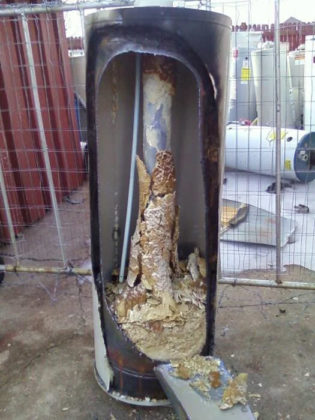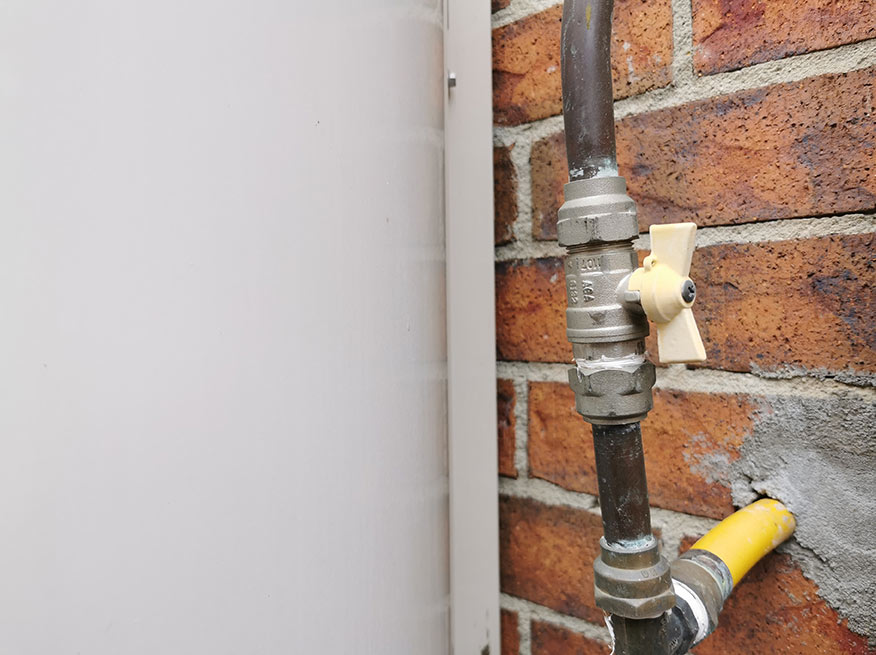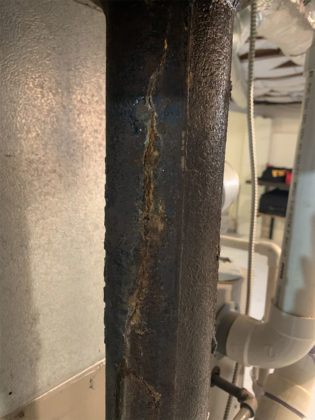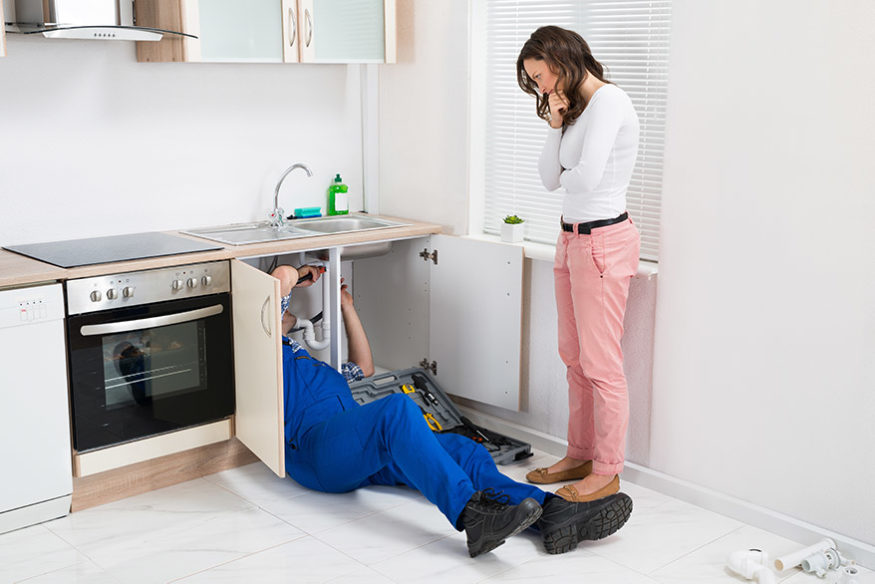Low hot water pressure in your home is not only an inconvenience, but it can actually signal something is wrong with your water systems. Left alone, it could turn into a serious issue that may cost a lot of money to fix. That is why you need to get low hot water pressure sorted out as quickly as possible.
One of the most common reasons for low hot water pressure is water scale and mineral buildup in the plumbing lines. Once it gets out of hand, the deposit can restrict water flow, causing the water pressure to drop. In other cases, the buildup is only isolated in the water heater.
Low hot water pressure can also be due to a broken shut-off valve, faulty faucets or fixtures, or something else altogether.
However, if you are not a plumber, it can be a bit difficult to figure out what, exactly, is wrong. Not to worry though, we are here to help.
In order to get your hot water pressure back to normal, we are going to cover some of the most common causes of what causes low hot water pressure and how to fix it.

How Is Water Pressure Supposed to Work?
First, let’s talk about how, exactly, water pressure in residential homes is supposed to work and then we will go on to common problems with water pressure systems and what you can do to fix them.
Most normal homes get their water through a municipal water provider. These providers gather water from some source (usually surface water sources like lakes, reservoirs, and rivers) and channel that water into pressurized tanks in high areas.
The displacement of this water relative to the ground is what generates water pressure. These tanks then connect to the various water mains that go into your home. When you turn on your faucet, the water now has an exit point, and the pressure forces it through, giving you a constant stream of water.
Hot water, specifically, must pass through a water heater first to get to the right temperature. Otherwise, the mechanisms for hot and cold water are exactly the same—gravity produces the pressure that forces water through your pipes.
Some water filters, such as reverse osmosis systems, require a certain amount of water pressure before they will function correctly. This is why low water pressure can be a bigger problem than you think.
Want The Quick Fix?
Get a local plumber to give you a free quote and solve your low water pressure problem for good!
Why Is My Hot Water Pressure Low?

Residential water systems are fairly complex so there are several potential reasons why your hot water pressure is off. Here are some of the most common reasons for low hot water pressure and how you can fix them.
Hard Water Build Up
Most water in residential areas has various minerals in it such as calcium, magnesium, potassium, and sodium (called “hard water”).
Gold Coast Plumbing Experts say that normally, you want to have some minerals in your water, but if there is too much, then these minerals can precipitate out of the solution and coat the inside of your plumbing lines.

This can cause water pressure to decrease as the water’s movement is restricted throughout the line. You can tell if you have a high mineral content in your water is if it creates a white film in your sink or tub fixtures, or it might be discolored slightly.
Solution
Depending on how serious the issue is, you can approach the issue in two ways.
- First, turn your water heater off and make sure the pilot light is off.
- Next, drain water from your water heater and replace it with about 2 gallons of vinegar.
- Next, turn the water heater back on and let the vinegar sit and circulate for about 6 hours. Vinegar can dissolve mineral deposits like calcium and magnesium build-up.
- Open all hot water faucets in your home and flush the system until you can no longer smell the vinegar. If done correctly, your water pressure will be fixed. If not, you may need to give it another round of vinegar. Vinegar is non-toxic so this is the preferred method for a DIY fix.
If limestone scale build-up is too severe, then you may need to get the help of a plumbing professional. Pros have special tools to fix limestone build-up in pipes.
Bent Water Supply Intake
Most water heaters have copper water pipes that let water flow through. Copper is a very pliable metal so it is easy for it to become bent and cut off water flow, thus reducing water pressure.
If one of the copper pipes to your water heater is bent, then that could be the culprit.
Solution
If the bend is not too serious, you could potentially rebend the line so it lays straight. However, if the line is too kinked, then you may have to replace those pipes.
You can usually find water heater pipe replacements at the nearest home goods store.
Broken Shut Off Valve

Most water heaters have a shut-off valve that regulates the flow of water. This valve is there in case you need to shut off the water flow to or from your water heater if you need to replace it or do some repairs.
In some cases, this valve can break and not open all the way. The reduction in size can cause problems with your hot water pressure.
Solution
First, find your water shut-off valve and give it a test. If you are lucky, it is just not open enough and you can twist it to open it all the way.
If your valve is actually broken then you will have to replace the valve.
You can most likely find a new shut off valve here.
If the valve is a screw-on type or a compression fitting with a top bolt, then you can replace the valve yourself by removing the old one, placing a new one, and screwing it back in.
If your water valve is soldered on, then you probably will need the help of a professional, unless you are experienced working with metal.
Just make sure that you shut off your home’s water main before removing the valve or you could make the problem worse.
All Water Pressure Is Low in Your Home
If it’s not just your hot water pressure that has a problem, then the problem might be with the pipe setup in your home.
A common reason for low water pressure through the whole house is your pipe setup. If your pipes crisscross and wind around too much, then the water has a longer distance to travel and so has reduced pressure.
Solution
If the problem is your water pipe set up, then there are two main ways to fix it. The first is to install a pressure regulator (available here) in your home’s plumbing system.
This device will give you water pressure the extra kick it needs to get back to normal.
The other option is to have a professional plumber adjust your system to increase the pressure. Most of the time, this will involve having to remove and rework some pipes.
If you can manage it, installing a pressure regulator might be the most economical option rather than ripping up and replacing pipes.
Cracked or Corroded Pipes
Many old homes are made using cast iron or steel pipes for their plumbing systems.
Unfortunately, cast iron and steel can rust and corrode easily. If your pipes corrode too much, this can create blockages and cause other kinds of problems in your home like leaks.

As we said, this issue is more common in old homes that use iron or steel pipes. Your pipes can also become cracked, causing leaks that reduce your overall water pressure.
Solution
If your iron or steel pipes are corroded, then the only real solution is to rip them out and replace them with newer pipes.
Most of the time, not all of the pipes will have corroded so you can hire a professional to cut out the corroded sections and replace just those with new pipes.
Many modern homes are made using PVC or ABS plastic pipes as these do not rust and are resistant to corrosion. PVC and ABS plastic pipes also tend to be cheaper than modern metal pipes.
Bad Faucets or Fixtures
In some cases, the problem with your hot water pressure might not be your pipes or your water heater but faucets or other fixtures at the end of the waterline.
Faucets can wear down from usage and not open all the way properly or they can have scale build-up. Both reasons can cause a drop in water pressure.
Solution
If your faucets are just worn down, then the solution is simple. All you have to do is replace the faucets. Make sure you take the old fixture to the hardware store so you can make sure you get the right-sized fixture.
If your fixture has scale build-up, then you can use vinegar to dissolve the mineral deposit and open the faucet back up.
- First remove the faucet, showerhead, etc.
- Next, place the fixture inside of a bucket full of a mixture of vinegar and water. You can also use a mixture of lemon juice and vinegar. You basically need an acidic solution to dissolve the basic components clogging up your pipes.
- Let the fixture sit submerged in the solution for a couple of hours.
- Then, replace the fixture and let it run for about 30 minutes to clear out any excess solution.
If done correctly, your water pressure should get back to normal.
Malfunctioning Pressure Regulator
The last common issue causing low hot water pressure is a broken pressure regulator.
A faulty pressure regulator reduces pressure input into your water system, which can cause random spikes and dips in your water pressure output.
You can determine if your pressure regulator is busted by checking the water pressure through your home’s plumbing.
Solution
- First, you will need a pressure gauge to an outdoor spigot connected by a hose.
- Then turn the water on to get a pressure reading. According to experts, the ideal water pressure for a home should be anywhere between 52-75 pounds per square inch (psi). If your water pressure is significantly lower than this, then you will have to call a professional to replace your pressure regulator.
Problems Caused by Low Hot Water Pressure

Fortunately, low hot water pressure is usually not destructive and will not cause any major damage to your home. In contrast, if your water pressure is too high, then it can cause stress in your pipes, leading to leaks and damages.
That being said, low water pressure can cause some problems. Here are some issues you might run into if you have low hot water pressure.
- Difficulty cleaning: Low water pressure might mean it is hard to clean soap and debris off of items you are trying to wash, whether it is dishes or something else. This can lead to nasty soap scum build up on your things if they are not thoroughly rinsed off.
- Appliances will not be as effective: Appliances that rely on hot water, such as a washing machine or dishwasher, may be less effective if you have low water pressure. In some cases, these devices can break if they do not get the required amount of water to work.
- Broken pipes cause leaks: If your low water pressure is caused by cracked or corroded pipes, then this can cause leaks in your home. Water leaks can actually be very destructive and rot away wood and drywall sections. In some cases, broken pipes can cause flooding. If your hot water problems are caused by broken or leaky pipes, then it is important that you get them fixed as quickly as possible.
- High mineral content can be bad for you: If the cause of low hot water pressure is scale build-up in your pipes, this can cause your water to have a funky and unappealing taste. Some mineral content in your water is actually good for you, but too much mineral content over too long of a time can lead to cardiovascular problems, neural disorders, kidney failure, and other health issues.
The Wrap Up
If your hot water pressure is off, the smartest thing to do is get the issue fixed quickly. We have given a rundown of the most common issues for low hot water pressure, but water systems are complex and the problem could lie elsewhere.
If none of our tips help you diagnose and fix the issue, then you may want to get the help of a professional plumber. They can use their expertise to help you identify and correct any issues before they lead to long-term problems.
I have a boiler that heats my home with hot water baseboard heat and also heats my water… I had a professional come in and run acid through the heating coil after he did this both the hot and cold water pressure was great ( both the same) after a few days the hot water pressure is low again… I didn’t see any leaks at my boiler
What is my issue??
My house is 7 years old and has low hot water pressure. Cold water has good pressure. There is a return line and recirculating pump on the cold input side of water heater. Hot water faucet runs well for about 30 seconds and after that the hot water flow drops to nearly half. Several plumbers came by. No one seems to know even basics . Any thoughts?
Same situation here! Our plumber thought it was the cartridge but it was not. 2 bathtubs were experiencing this and then all of a sudden, our shower and then a few weeks later, our kitchen sink.